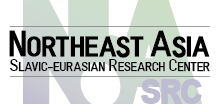This year once again saw the IGU hold a regional conference, this time at Lomonosov Moscow State University from August 17-21. The choice of Moscow as a venue reflects the fact that the Presidency of the IGU is currently held by Vladimir Kolosov of the Russian Academy of Sciences. Both Kolosov's own interest in the discipline and the exemplary recent work of Virginie Mamadouh and Takashi Yamazaki as co-chairs of the Commission for Political Geography, building upon the foundations ably laid by Elena dell'Agnese, ensured that political geography was well represented at what is always a mammoth event.
The first panel sponsored by the CPG was organized by Iwashita Akihiro and Paul Richardson, sadly unable to be present in Moscow, and entitled 'Bordering Eurasia: Politics, Power and Political Geography', filling the three available sessions on the Monday afternoon. A combination of the heavy security in place due to the attendance of various grandees at the opening ceremony and the puzzling decision to hold the session in a room the size of a shoebox (despite the presence of the IGU's own president on the panel) entailed a slight delay, but a quick change of room saw proceedings underway. The first session was chaired by Akihiro Iwashita himself, and was kicked off by Deepika Saraswat, winner of the Commission's travel grant, discussing the convergence in Russian and Iranian geopolitical interests. She was followed by two papers that focused more upon the idea of Europe, with James Scott's examination of the EU's conception of 'neighborhood' and Jussi Laine's take on the multi-scaler nature of the Finnish-Russian border. Unfortunately, although he was present briefly and did say a few words, Vladimir Kolosov was absolutely rushed off his feet and unable to present his own paper. Despite the unconventional start, the session was a fascinating exploration of grander geopolitical narratives and their connections to often localized events.
The second session reversed this perspective and focused at more small-scale examples of political processes while connecting them to their global context. Papers by Anna Casaglia and Frédéric Durand examined efforts at cross-boundary cooperation either induced from above or emerging from below, that of Fedor Popov sought to offer a sustained theoretical consideration of the space of secession, while Arnon Medzini examined the power of cartography. Finally, the third session provoked the liveliest debate, aided by the fact that just two of the speakers were present, opening up more time for discussion. Nurettin Özgen offered an impassioned argument for the dissolution of Sykes-Picot and establishment of a Kurdish state, while Edward Boyle sought to discuss the scaler issues involved in the consideration of borders through the lens provided by Japan's recent promotion of its territorial disputes as all involving her 'integral territory'.
These excellent sessions segued nicely into many other issues touched on over the course of the conference. Takashi Yamazaki offered a powerful thematic lecture on the Tuesday that examined questions of sovereignty at the micro level, through an examination of the United States military's bases on Okinawa, which again connected seemingly local questions of borders and territory with much broader geopolitical concerns. There were a number of fine plenary speeches, including those by Georg Gartner on the importance of cartography, and particularly that by Alex Murphy on the relevance of geography and necessity of promoting its expertise in corridors of power. The security presence on the first day, and position of Sergei Shoygu, Russia's current Minister of Defense, as President of the Russian Geographical Society, attested to the fact that, in one country at least, the link between geography and power is in fine shape. The conference's venue served to remind all the participants of the importance of this, in three new buildings just opposite Stalin's magnificent, imposing university building, demonstrating that geography is still an intensely political endeavor.
(written by Edward Boyle, Kyushu University)

 Eurasia Unit for Border Research (Japan)
Eurasia Unit for Border Research (Japan)




